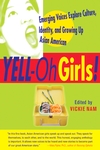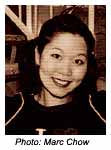|
Interview
with Vickie Nam, Editor of Yell-Oh
Girls! :
Emerging Voices Explore Culture, Identity, and Growing Up Asian
American
 Read
the AllHip Interview with Vicki Nam Read
the AllHip Interview with Vicki Nam
 Vickie
Nam was most recently content/community producer at VOXXY, the L.A.
-- based interactive network for girls. She was formerly managing
producer at AsianAvenue.com, news team coordinator at Teen People,
and editor in chief of Blue Jean Magazine. Her work has appeared
in Seventeen, Jump, and KoreAM Journal. Vickie lives in Los Angeles. Vickie
Nam was most recently content/community producer at VOXXY, the L.A.
-- based interactive network for girls. She was formerly managing
producer at AsianAvenue.com, news team coordinator at Teen People,
and editor in chief of Blue Jean Magazine. Her work has appeared
in Seventeen, Jump, and KoreAM Journal. Vickie lives in Los Angeles.
Q: How would you describe/classify yourself
as a writer/editor? What are some of your key creative interests,
hobbies, and professional highlights?
A: I'm a writer and an editor. An Asian American. A girl.
All at once and in no particular order. All of these characteristics
inform my perspective and worldview as a person living in contemporary
society. I love traveling, and my favorite part about traveling
is catching the sunset in various locations. Writing freestyle.
And I love creating things with my hands. (Have you ever tried painting
pottery?)
To some, my career path appears a bit convoluted. The transitions
haven't made logical sense to outsiders, but, to me, every single
career choice I've ever made was carefully planned and pursued with
curiosity and passion. When I graduated from Wellesley College,
I wanted to dedicate myself to work that was empowering to girls,
creative, and interactive. At times I questioned my decisions, especially
when I noticed the huge salary differences that existed between
entry-level workers in investment banking and consulting, for instance,
and entry-level editors. I wanted to find a way to integrate the
skills I'd learned in college as a women's studies and American
studies double major in my professional work. As a journalist, I
would be able to explore a range of interests while covertly working
toward initiating change as a producer of media and culture.
I was the editor-in-chief of an alternative, advertising-free magazine
called Blue Jean Magazine, which was aimed at girls who wanted to
read material that departed from the rhetoric of mainstream, teen
glossies. I worked with a smart, tenacious, forward-thinking team
of teen editors and correspondents. After a year I moved to New
York City to manage the News Team at Teen People. There, I worked
for almost two years with aspiring teen reporters who had the power
to pitch stories, write reviews, and share their perspectives on
a range of issues. This program was revolutionary. It evidenced
the desire among teens to exercise the power to actively engage
with the media, and offer their own perspectives on social and political
issues. The teens I worked with were effectively resisting the myth
that they were in any way irresponsible, foolish, and conformist.
My stint at AsianAvenue.com was a leap toward cultivating new skills
in the Internet genre. And I moved to LA in search of freedom and
the chance to grow up. I worked for VOXXY, an interactive network
for teen girls that, unfortunately, didn't survive last year's dot-com
shakeout.
Q: Your book "Yell-Oh Girls!" focuses on cultural
identity of Asians growing up in America. Can you talk briefly about
your feelings and experience of growing up between two cultures.
A: I can't talk about my personal history without discussing
the area where I grew up - my friends, my family, the general atmosphere
of suburban life in upstate New York. I'm sure it took longer for
me to figure out where it is I belonged in my community because
I was raised in a cross-cultural landscape. My parents are 1st-generation
Korean. They immigrated to the US around 30 years ago, before I
was born. They are arguably more progressive than other traditional
Korean parents, but, in many ways, they have adhered to tradition.
Pittsford, my hometown, wasn't diverse. I could count the number
of non-white kids in my elementary school class on one hand. I was
among the only Asian kids, and for a long time I didn't know that
I was different from anyone else. I had some indication that my
Euro-American peers didn't see me as a part of their group, and
at times I felt that there were limitations placed on the extent
to which I was allowed to mingle, mix, and blend into the social
circles at school. The "chink" jokes and other racist slurs would
follow me around when I went to the mall, checked out books at the
library, or stood in line at the grocery store. And I watched as
certain people would mimick my father's accented English, or when
a man demanded that my mother roll down her car window in a parking
lot so he could bark the words "Go back to China!" in her face.
It wasn't until high school that I was starting to ask critical
questions about my place in the world. It's when, perhaps, we all
start to realize how our values and beliefs echo or depart from
the "norm" and we first express the need or desire to be seen as
individuals. I felt torn. So often it felt like I was balancing
my conflicting roles that shifted according to my location. At home,
I was expected to be the good, obedient, Korean daughter. At school,
I was expected to be aggressive - to compete with my peers for popularity
and stellar grades. Performing these roles for others made it difficult
for me to find my own voice. These are the memories and experiences
that fueled my passion to edit YELL-Oh Girls!
Continued:
Read More
|
Buy
Yell-Oh Girls!
Read
the Exclusive AllHip Interview of
Editor Vickie Nam where she talks about her experiences
as a journalist, about editing the book, experiences growing up
Asian in America, her thoughts on Pop Culture, Mentors and on finding
her voice and personal mission.
Story About the Book
Yell-Oh Girls! Editor Vicki Nam Discusses the genesis
of the book.
Read Excepts from
the Book Yell-Oh Girls!
Alaina Wang Excerpt: "China Doll"
|





 Vickie
Nam was most recently content/community producer at VOXXY, the L.A.
-- based interactive network for girls. She was formerly managing
producer at AsianAvenue.com, news team coordinator at Teen People,
and editor in chief of Blue Jean Magazine. Her work has appeared
in Seventeen, Jump, and KoreAM Journal. Vickie lives in Los Angeles.
Vickie
Nam was most recently content/community producer at VOXXY, the L.A.
-- based interactive network for girls. She was formerly managing
producer at AsianAvenue.com, news team coordinator at Teen People,
and editor in chief of Blue Jean Magazine. Her work has appeared
in Seventeen, Jump, and KoreAM Journal. Vickie lives in Los Angeles.